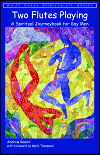Bohemian Splendor
When I read about the subject of this issue I was stumped about what to say. Nothing came to mind at all. I was going to call Bo and Dan and ask them to assign this column to someone else. Then I remembered that some people write by design but I write by happenstance, trusting that the events of my life will give me the ideas I need, with the same random perfection as a tarot spread.
Lately my bedtime reading has been Queer Cowboys: And Other Erotic Male Friendships in Nineteenth Century American Literature, by Chris Packard, which I bought in hopes of grounding my dislike of Brokeback Mountain in an historical context. Several nights ago, toward the end of the book, I read about Irish-born John Boyle O’Reilly, who lived from 1844 to 1890, and founded a private men’s club in Boston based upon the ideals he wrote about in his poem “In Bohemia,” which was, according to Packard, a favorite piece to be recited in Victorian American drawing rooms. That was the first card dealt me by the Cosmic Shuffler. Here’s a bit of the poem.
I’d rather live in Bohemia than in any other land
For only there are values true,
And laurels gathered in all men’s view.
Bohemia? That region of Central Europe which occupies the western and middle thirds of the Czech Republic? No, our Bohemia reflects a false French perception, held since the 15th century, that the gypsies, those free souls, originally came from Bohemia. Hence, Bohemian: outsiders, artists and writers who live apart from conventional society and its restrictions.
The day after I read about John Boyle O’Reilly and his poem I received a postcard in the mail that said on it: “High Tea in Low Drag.” An invitation to a 90th birthday celebration for John Burnside, the four-decade partner of Harry Hay. John in elegant elder profile, is wearing a large-brimmed hat covered with flowers and plumes, a bright pink feather boa around his neck, lifting a delicate blue and white china saucer and teacup to his lips. My next card from the Eternal Tarot Deck.
Lastly, Divine Happenstance provided me with the final elements in my spread, from the book I was reading on a plane to Erie in the state I call Pencilvania, where I was going to visit my oldest friend Irmgard, who is slowly and elegantly dying of cancer. My travel book was The Amazing Adventures of Kavalier and Clay, by Michael Chabon, a fun romp through Comic Book Land full of superheroes, their cute boy wards, and a sad/sweet gay plotline. High above the Rockies I came upon a passage about a private men’s club located in Prague. “Prague you say? Isn’t that the capital of the Czech Republic? And isn’t it located in Bohemia?” Yes, exactly. “And who were the members of that club?” I hear you asking. Well, the club was a gathering place for the performing magicians of Bohemia, in a city that (I quote Chabon) has “produced some of history’s greatest charlatans, conjurors, and fakirs.”
Private club. Bohemian. That sounds like some aspects of gay life. But what made the literary tarot spread even better was a drawing in pen and ink that keeps appearing in the book. Done by a precocious young boy, to illustrate his opera libretto, it’s a picture of Harry Houdini, the great escape artist, wearing a dinner jacket and hurtling down to earth from an airplane, along with a parachute, two chairs, a table, and tea set. Houdini is smiling as he takes his cup of tea in the middle of the sky.
So what can I say about Bohemian Splendor now? That there’s something artificial about it, with an emphasis on the art. And yet, by right or wrong attribution, it’s also about being vibrantly alive, creative, and counter-cultural. It’s about private clubs and what goes on in them. There’s something magical about it, alienating, that finds us in unlikely situations, doing ordinary things like sipping tea. But what the hell can I offer you by way of a spiritual practice? How can you practice something that by its very definition is supposed to be spontaneous, carefree, and unpremeditated, or at least pretending to be so?
For the first time in this column on spiritual practice – there will be no practice. But our last issue was on charlatans (a club to which you may now include me), and since the issue before that one was on eldering, please consider the following practice as being entirely separate from this issue, hurtling through space in a teacup all by itself, or riding on the back of an opalescent crane.
Harry Hay, a father of the Mattachine Society in one generation and of the Radical Faeries in the next, shared his life with a man whose Bohemian Splendor continues to inspire us. And it is our job as their spiritual sons to see that John Burnside, in feathers and laurels, is well taken care of. Beyond his own limited resources, an additional $12,000 a year is needed to care for John. So:
1. Get out your checkbook
2. Write a check to the “Harry Hay Fund” for whatever amount feels right to you
3. Mail it to:
Chas Nol
816 Waller Street
San Francisco, CA 94117
4. Along with a short note wishing John a happy birthday and thanking him for all of his gifts to our tribe.
This is just an excerpt from this issue of White Crane. We are  reader-supported and need you to subscribe to keep this conversation going. So to read more from this wonderful issue SUBSCRIBE to White Crane. Thanks!
reader-supported and need you to subscribe to keep this conversation going. So to read more from this wonderful issue SUBSCRIBE to White Crane. Thanks!
Andrew Ramer lives in San Francisco.
He is the author of the gay classic Two Flutes Playing
(available from www.gaywisdom.org)
Praxis is a regular feature in each issue of White Crane.


